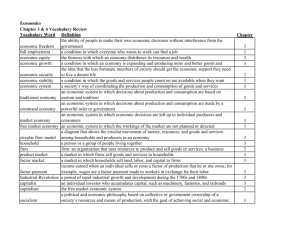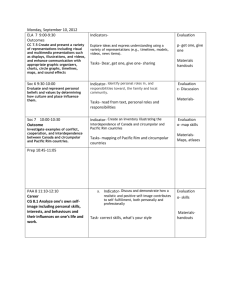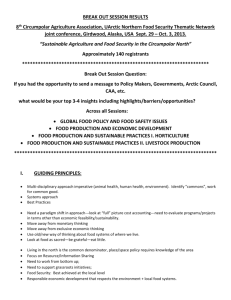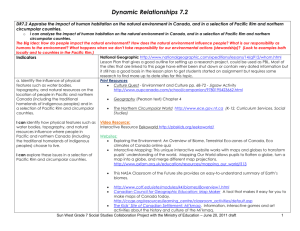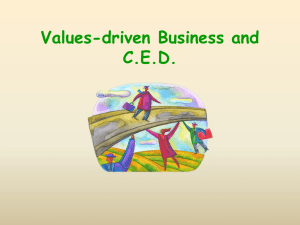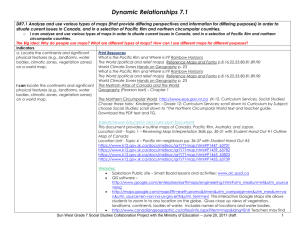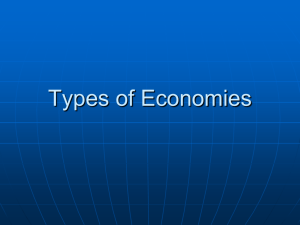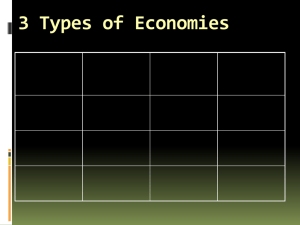RW 7.1, RW 7.2, RW 7.3 Unit Plan 2
advertisement
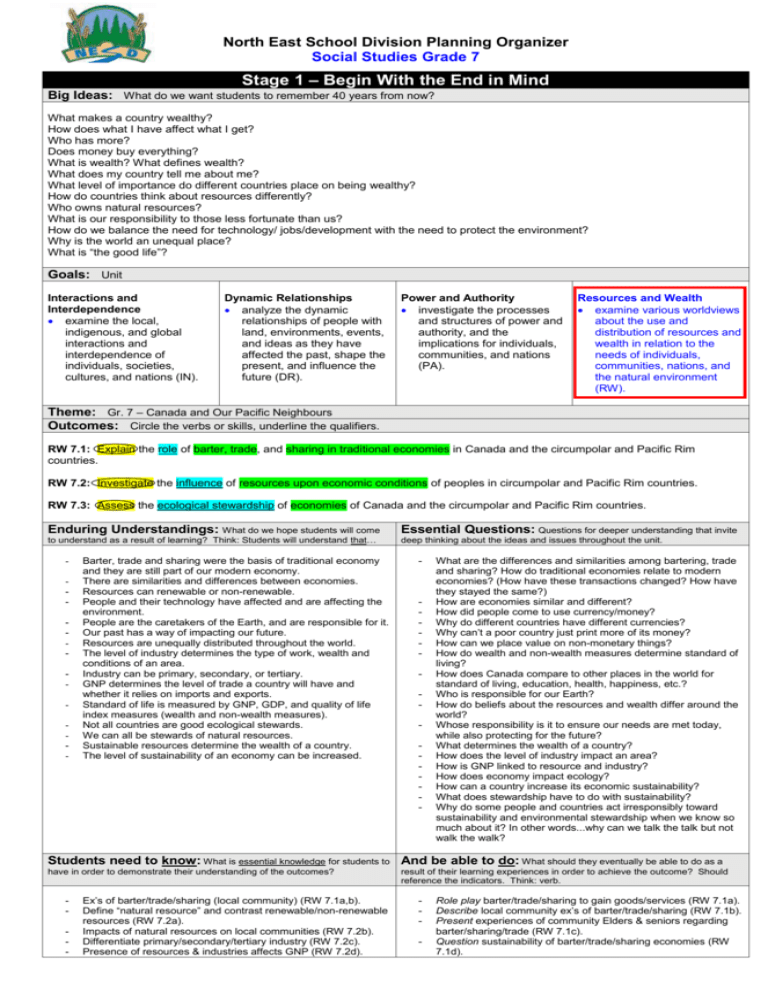
North East School Division Planning Organizer Social Studies Grade 7 Stage 1 – Begin With the End in Mind Big Ideas: What do we want students to remember 40 years from now? What makes a country wealthy? How does what I have affect what I get? Who has more? Does money buy everything? What is wealth? What defines wealth? What does my country tell me about me? What level of importance do different countries place on being wealthy? How do countries think about resources differently? Who owns natural resources? What is our responsibility to those less fortunate than us? How do we balance the need for technology/ jobs/development with the need to protect the environment? Why is the world an unequal place? What is “the good life”? Goals: Unit Interactions and Interdependence examine the local, indigenous, and global interactions and interdependence of individuals, societies, cultures, and nations (IN). Dynamic Relationships analyze the dynamic relationships of people with land, environments, events, and ideas as they have affected the past, shape the present, and influence the future (DR). Power and Authority investigate the processes and structures of power and authority, and the implications for individuals, communities, and nations (PA). Resources and Wealth examine various worldviews about the use and distribution of resources and wealth in relation to the needs of individuals, communities, nations, and the natural environment (RW). Theme: Gr. 7 – Canada and Our Pacific Neighbours Outcomes: Circle the verbs or skills, underline the qualifiers. RW 7.1: Explain the role of barter, trade, and sharing in traditional economies in Canada and the circumpolar and Pacific Rim countries. RW 7.2: Investigate the influence of resources upon economic conditions of peoples in circumpolar and Pacific Rim countries. RW 7.3: Assess the ecological stewardship of economies of Canada and the circumpolar and Pacific Rim countries. Enduring Understandings: What do we hope students will come Essential Questions: Questions for deeper understanding that invite to understand as a result of learning? Think: Students will understand that… deep thinking about the ideas and issues throughout the unit. - Barter, trade and sharing were the basis of traditional economy and they are still part of our modern economy. There are similarities and differences between economies. Resources can renewable or non-renewable. People and their technology have affected and are affecting the environment. People are the caretakers of the Earth, and are responsible for it. Our past has a way of impacting our future. Resources are unequally distributed throughout the world. The level of industry determines the type of work, wealth and conditions of an area. Industry can be primary, secondary, or tertiary. GNP determines the level of trade a country will have and whether it relies on imports and exports. Standard of life is measured by GNP, GDP, and quality of life index measures (wealth and non-wealth measures). Not all countries are good ecological stewards. We can all be stewards of natural resources. Sustainable resources determine the wealth of a country. The level of sustainability of an economy can be increased. - - What are the differences and similarities among bartering, trade and sharing? How do traditional economies relate to modern economies? (How have these transactions changed? How have they stayed the same?) How are economies similar and different? How did people come to use currency/money? Why do different countries have different currencies? Why can’t a poor country just print more of its money? How can we place value on non-monetary things? How do wealth and non-wealth measures determine standard of living? How does Canada compare to other places in the world for standard of living, education, health, happiness, etc.? Who is responsible for our Earth? How do beliefs about the resources and wealth differ around the world? Whose responsibility is it to ensure our needs are met today, while also protecting for the future? What determines the wealth of a country? How does the level of industry impact an area? How is GNP linked to resource and industry? How does economy impact ecology? How can a country increase its economic sustainability? What does stewardship have to do with sustainability? Why do some people and countries act irresponsibly toward sustainability and environmental stewardship when we know so much about it? In other words...why can we talk the talk but not walk the walk? Students need to know: What is essential knowledge for students to And be able to do: What should they eventually be able to do as a have in order to demonstrate their understanding of the outcomes? - Ex’s of barter/trade/sharing (local community) (RW 7.1a,b). Define “natural resource” and contrast renewable/non-renewable resources (RW 7.2a). Impacts of natural resources on local communities (RW 7.2b). Differentiate primary/secondary/tertiary industry (RW 7.2c). Presence of resources & industries affects GNP (RW 7.2d). result of their learning experiences in order to achieve the outcome? Should reference the indicators. Think: verb. - Role play barter/trade/sharing to gain goods/services (RW 7.1a). Describe local community ex’s of barter/trade/sharing (RW 7.1b). Present experiences of community Elders & seniors regarding barter/sharing/trade (RW 7.1c). Question sustainability of barter/trade/sharing economies (RW 7.1d). - - - Standard of living may be measured using material wealth measures (gross national product, gross domestic product) and/or non-material measures (the quality of life index, happiness index) (RW 7.2e). Origins & current meanings “steward”, “stewardship” (RW 7.3a). Define “sustainable” vs “unsustainable” with respect to resources and industry (RW 7.3b). Practices which might the level of sustainability (RW 7.3c). - Basic research skills including source location, source reliability, citing, note-taking, and sorting information. - Formulate a definition of natural resource, and differentiate between renewable vs non-renewable resources (RW 7.2a). Identify locations of natural resources of circumpolar/Pacific Rim countries using maps, and analyze the impact of resources on local communities (RW 7.2b). Correlate presence of resources & industries to the gross national product of circumpolar/Pacific Rim countries (RW 7.2d). Draw conclusions about standard of living in Pacific Rim & circumpolar countries using material wealth measures & nonmaterial measures (RW 7.2e). Research & illustrate origins and current meanings of “steward” and “stewardship” (RW 7.3a). Define “sustainable”, and discriminate between sustainable and unsustainable as they apply to resources & industry (RW 7.3b). Examine sustainability of economies of circumpolar/Pacific Rim countries, and propose practices to sustainability (RW 7.3c). - - - Terms to Know: Barter Sustainable Non-renewable Resource Tertiary Industry Circumpolar GDP Circumpolar Steward Trade Resource Primary Industry GNP Goods & Services Quality of Life Index Unsustainable Stewardship Sharing Renewable Resource Secondary Industry Pacific Rim Standard of Living Happiness Index Natural Resource - - Compare and contrast. Describe examples. Draw conclusions and support opinion with evidence. Propose solutions to issues/problems/concerns. Stage Two – Critical Evidence of Understanding Formative Assessment: Through what multiple sources of evidence will students demonstrate their understanding on a daily basis. - - Anecdotal Records and Observations. Informal Checks for Understanding. Entrance/Exit Cards. Class Discussions and Debates/Jigsaw. Think/Pair/Share. In-class questions/Assignments. Summative Assessment: Is an assessment of what students know and can do according to the outcomes. It is a snapshot in time, used for reporting. - Mapping Assignment. Yellow Pages Activity. Standard of Living Comparison. Quizzes. Unit Exam. Criteria for Assessment: Explain role of barter, trade, and sharing in traditional economies. Investigate influence of resources upon economic conditions. Assess ecological stewardship of economies. Rubrics for Assessment of Outcomes: Use this rubric throughout teaching and assessing - both formatively and summatively. All learning experiences should relate back to assessment of student’s degree of outcome achievement (goal attainment). Please note: rubric numbers do not equate grades. For example, a “3 or Meeting Expectations” is not equivalent to a “75%”. Please note: “Exceeding Expectations” means the student has generally moved (where possible) one level higher in Bloom’s Taxonomy of Critical and Creative Thinking than the verb defining “Meeting Expectations” for a particular outcome. Note: the defining verb is subject to change. Resources and Wealth Outcome: 7.1: Explain the role of barter, trade, and sharing in traditional economies in Canada and the circumpolar and Pacific Rim countries. 7.2: Investigate the influence of resources upon economic conditions of peoples in circumpolar and Pacific Rim countries. 7.3: Assess the ecological stewardship of economies of Canada and the circumpolar and Pacific Rim countries. Fully meeting expectations, with enriched understanding (EU) Fully meeting grade level expectations (FM) Mostly meeting grade level expectations (MM) Not yet meeting grade level expectations (NY) You can explain the role of barter, trade, and sharing in traditional economies in Canada and the circumpolar and Pacific Rim countries in depth. You can select evidence to show effectiveness of this economy as compared to others. You can provide examples of the influence of resources upon economic conditions of peoples in circumpolar and Pacific Rim countries. You can summarize the connection/importance of resources to economics. You can explain the role of barter, trade, and sharing in traditional economies in Canada and the circumpolar and Pacific Rim countries. With help, you can mostly explain the role of barter, trade, and sharing in traditional economies in Canada and the circumpolar and Pacific Rim countries. Spend time clarifying important concepts and relating them to a variety of economies. You are having trouble showing understanding of barter, trade, and sharing. Make sure you are clear about what barter, trade and sharing means. You can investigate the influence of resources upon economic conditions of peoples in circumpolar and Pacific Rim countries. With help, you can investigate the influence of resources upon economic conditions of peoples in circumpolar and Pacific Rim countries. Spend time considering types of resources, their location and importance to a variety of countries. You are having trouble showing understanding of the influence of resources upon peoples’ economic conditions. Keep working on drawing connections between resources and economic conditions. You can debate and differentiate between the ecological stewardship of economies of Canada and the circumpolar and Pacific Rim countries and provide details to support your arguments. You can assess the ecological stewardship of economies of Canada and the circumpolar and Pacific Rim countries and provide examples to support your ideas. With help, you can mostly assess the ecological stewardship of economies of Canada and the circumpolar and Pacific Rim countries. Work on becoming clear about the meaning of ecological stewardship and investigating the practices of various countries so you can further support you ideas. You are having trouble assessing ecological stewardship of economies. Work on identifying sound and unsound practises, and drawing connections/ conclusions. Stage Three – Learning Plan The Learning Plan should guide your day-to-day operations based on the natural order of learning experiences necessary to achieve the outcomes by all students. 1) Barter, Trade, Share: video clips, history, cloze notes and examples of each from local community (chart). 2) Role Play: Barter, Trade, Share. Barter Bags Activity with Reflection Questions. 3) Resources Reading (renewable, non-renewable), Notes, Current Event: Effects of Drilling for Oil and Reflection Questions. 4) World Map: mapping resources, and identifying which countries are rich in resources that are essential to our lives. Reflection Questions. 5) Current Event: Grande Prairie Boomtown Oil Sands Article and Reflection Questions. 6) Amazon Rainforest Natural Resources and Aboriginal Peoples. 7) Current Event: Saskatchewan’s Economy is Booming. 8) Primary, Secondary, Tertiary Industries (Yellow Pages activity and Quiz). 9) Incomes Around the World: GDP, GNP, Standard of Living. 10) Videos: Bhutan (Gross Domestic Happiness), and Denmark (Happiest Place on Earth). 11) Current Event articles: Denmark -> compare and contrast to Canada (#10). 12) Standard of Living Computer-Based Research Comparisons/Conclusions (Developing World -> Human Development Index) and Mapping. 13) Research “steward”/”stewardship” – Etymology and Current Meanings. 14) Sustainable Development cloze notes (sustainable/unsustainable resources/industry; practices which might increase level of sustainability). 15) Unit Exam. Reflection How did each student experience the learning through the unit? How did my plan transfer to practice? Kristen Holmgren ~ MUCC ~ August, 2010
